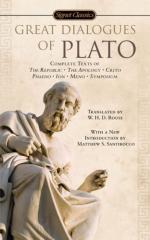|
This section contains 853 words (approx. 3 pages at 400 words per page) |

|
Republic: Book VI Summary
Socrates continues to describe the nature of the true philosopher. The philosopher will take great pleasure in knowledge, have a good memory, and be a virtuous person. Before he can continue his account of the philosopher, though, Socrates is interrupted by Adeimantus, who asks why, if philosophers are so virtuous, so many of them turn out to be useless or even positively evil. They are considered useless, Socrates argues, because the average person is unable to perceive their use because of their own blindness to philosophy. The supposedly wicked philosophers are, in fact only imitators, such as the Sophists, who take the opinions of the people and disguise them as philosophy. True philosophers will be hated by the world, but only because they reject the opinion of the many and prefer absolute truth, of which the multitude is ignorant...
(read more from the Republic: Book VI Summary)
|
This section contains 853 words (approx. 3 pages at 400 words per page) |

|




